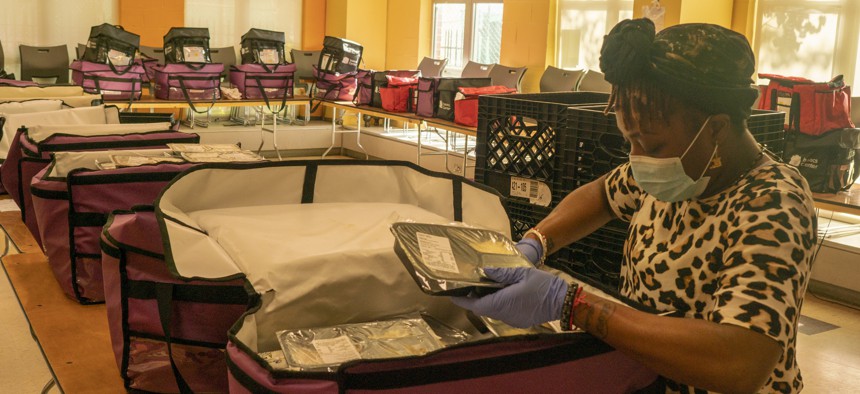Staff providing home-delivered meals deserve COVID-19 vaccine eligibility, charities say

Citymeals on Wheels personnel wearing mask prepare meal deliveries. Citymeals on Wheels
A group of nonprofits and county agencies dedicated to helping older adults are calling on New York state to expand COVID-19 vaccine eligibility to delivery drivers, cooks, volunteers and other front-line personnel at food banks, pantries and organizations offering home-delivered meals.
In a letter sent to Gov. Andrew Cuomo on Feb. 4, the group asked that essential workers at food assistance charities be included in the current phase of vaccine distribution as vaccine supply increases, particularly given recent guidance that allows counties to open up vaccines to restaurant and food delivery workers.
“I would think our meal deliverers would take precedence over other restaurant delivery people because … they are in contact with the most vulnerable New Yorkers,” said Beth Shapiro, executive director of Citymeals on Wheels.
Katelyn Andrews, director of public policy at LiveOn NY, an organization that advocates on behalf of older adults and the nonprofits serving them, said that COVID-19 spread among meal delivery staff can disrupt services. “We have had a number of cases where the professional delivering the meal becomes COVID-positive and has to quarantine and stop their route. And at that time, it becomes a scramble within organizations, who are operating on really shoestring budgets, to find somebody to make sure that there's a continuity of service and the meal still gets out.”
Gov. Andrew Cuomo has previously cited limited COVID-19 vaccine supply as a reason for declining to expand eligibility further. “Tell me, who do you want to remove from eligibility?” he said last week when asked about adding restaurant workers. “You want to add someone? We already don’t have enough? Who do you want to remove – teachers, police, fire, the 65-plus?” However, noting an expected influx in additional doses, he reversed course the next day by allowing local governments to expand access to restaurant workers, taxi drivers and developmentally disabled people.